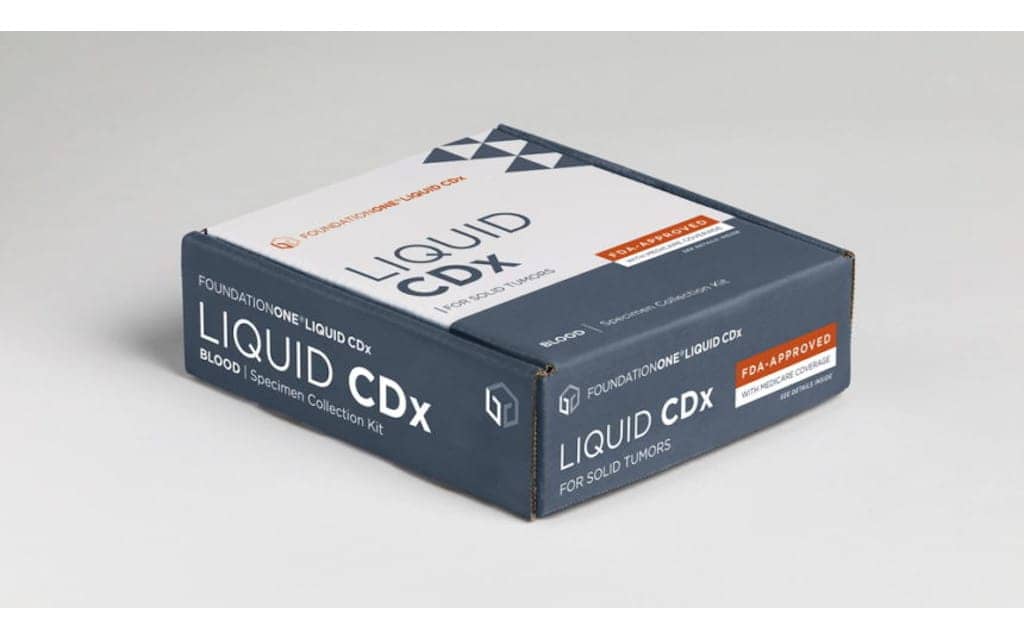Foundation Medicine Inc, Cambridge, Mass, announced that the FDA approved FoundationOne Liquid CDx for three new companion diagnostic indications to help match patients who may benefit from treatment with specific FDA-approved targeted therapies. The new indications are for Piqray (alpelisib) in advanced or metastatic breast cancer; Rubraca (rucaparib) in advanced ovarian cancer; and Alecensa (alectinib) in a certain type of metastatic non-small cell lung cancer (mNSCLC). The FDA also approved a label expansion for FoundationOne Liquid CDx to report additional select copy number alterations and genomic rearrangements.
FoundationOne Liquid CDx analyzes the largest genomic region of any FDA-approved comprehensive liquid biopsy test and was approved in August to provide tumor mutation profiling in accordance with professional guidelines for patients with any solid tumor. Concurrently, it was approved as a companion diagnostic for a poly (ADP-ribose) polymerase (PARP) inhibitor approved by the FDA for the treatment of metastatic castration-resistant prostate cancer patients with qualifying BRCA1/2 alterations, and for three first-line EGFR tyrosine kinase inhibitors (TKIs) for the treatment of non-small cell lung cancer patients.
“FoundationOne Liquid CDx offers oncologists an important and minimally invasive tool to consider when making treatment decisions for their patients, regardless of the type of cancer they have,” says Brian Alexander, MD, MPH, chief medical officer at Foundation Medicine. “These three additional companion diagnostic claims expand the test’s clinical utility into breast and ovarian cancer, demonstrating our commitment to bringing precision medicine to more patients, and we plan to continue working with our biopharma partners to increase that reach.”
This new approval expands FoundationOne Liquid CDx’s companion diagnostic indications to include the following targeted therapies:
- Piqray (alpelisib), a kinase inhibitor from Novartis indicated for use in combination with fulvestrant for the treatment of postmenopausal women, and men, with hormone receptor (HR)-positive, human epidermal growth factor receptor 2 (HER2)-negative, PIK3CA mutated, advanced or metastatic breast cancer following progression on or after an endocrine-based regimen. PIK3CA is the most commonly mutated gene in HR+/HER2- breast cancer; approximately 40% of patients living with HR+/HER2- breast cancer have this mutation.1
- Rubraca (rucaparib), Clovis Oncology’s poly (ADP-ribose) polymerase (PARP) inhibitor for the treatment of adult patients with a deleterious BRCA mutation (germline and/or somatic)-associated epithelial ovarian, fallopian tube, or primary peritoneal cancer who have been treated with two or more chemotherapies. Select patients for therapy based on an FDA-approved companion diagnostic for Rubraca. An estimated one in four women with epithelial ovarian cancer have a mutation of the BRCA1 or BRCA2 gene.2
- Alecensa (alectinib) is a tyrosine kinase inhibitor (TKI) from Genentech, a member of the Roche Group, indicated for the treatment of patients with anaplastic lymphoma kinase (ALK)-positive mNSCLC, as detected by an FDA-approved test. ALK rearrangements are identified in approximately 5% of NSCLC patients.3
Using a blood sample, FoundationOne Liquid CDx analyzes over 300 cancer-related genes for genomic alterations. FoundationOne Liquid CDx results are delivered in an integrated report that identifies alterations matched to FDA-approved therapies. It also enables accelerated companion diagnostic development for biopharma companies developing precision therapeutics.
As a laboratory professional service which has not been reviewed or approved by the FDA, the FoundationOne Liquid CDx report delivers information about the genomic signatures microsatellite instability (MSI) and blood tumor mutational burden (bTMB), as well as single gene alterations, including NTRK fusions, to help inform the use of other therapies including immunotherapies. Also, as a laboratory professional service, the report provides relevant clinical trial information and includes interpretive content developed in accordance with professional guidelines in oncology for patients with any solid tumor.
For more information, visit Foundation Medicine.
References
1 The Cancer Genome Atlas Network. Comprehensive molecular portraits of human breast tumours. Nature. 2012;490(7418):61-70.
2 Pennington et al, Clin Cancer Res. 2014; 20(3):764-775
3 Dearden et al. Ann Oncol. 2013 Sep; 24(9): 2371–2376.





